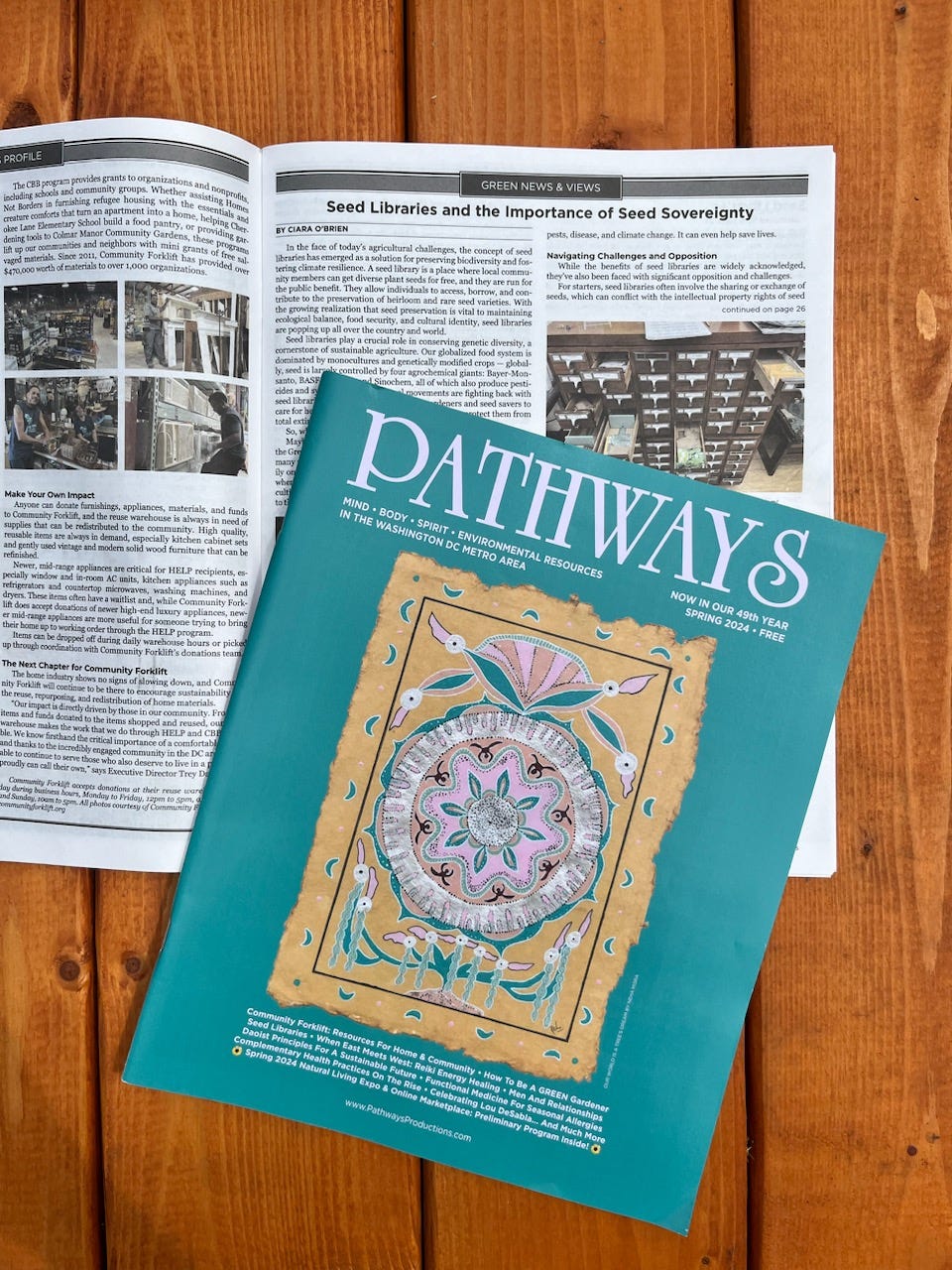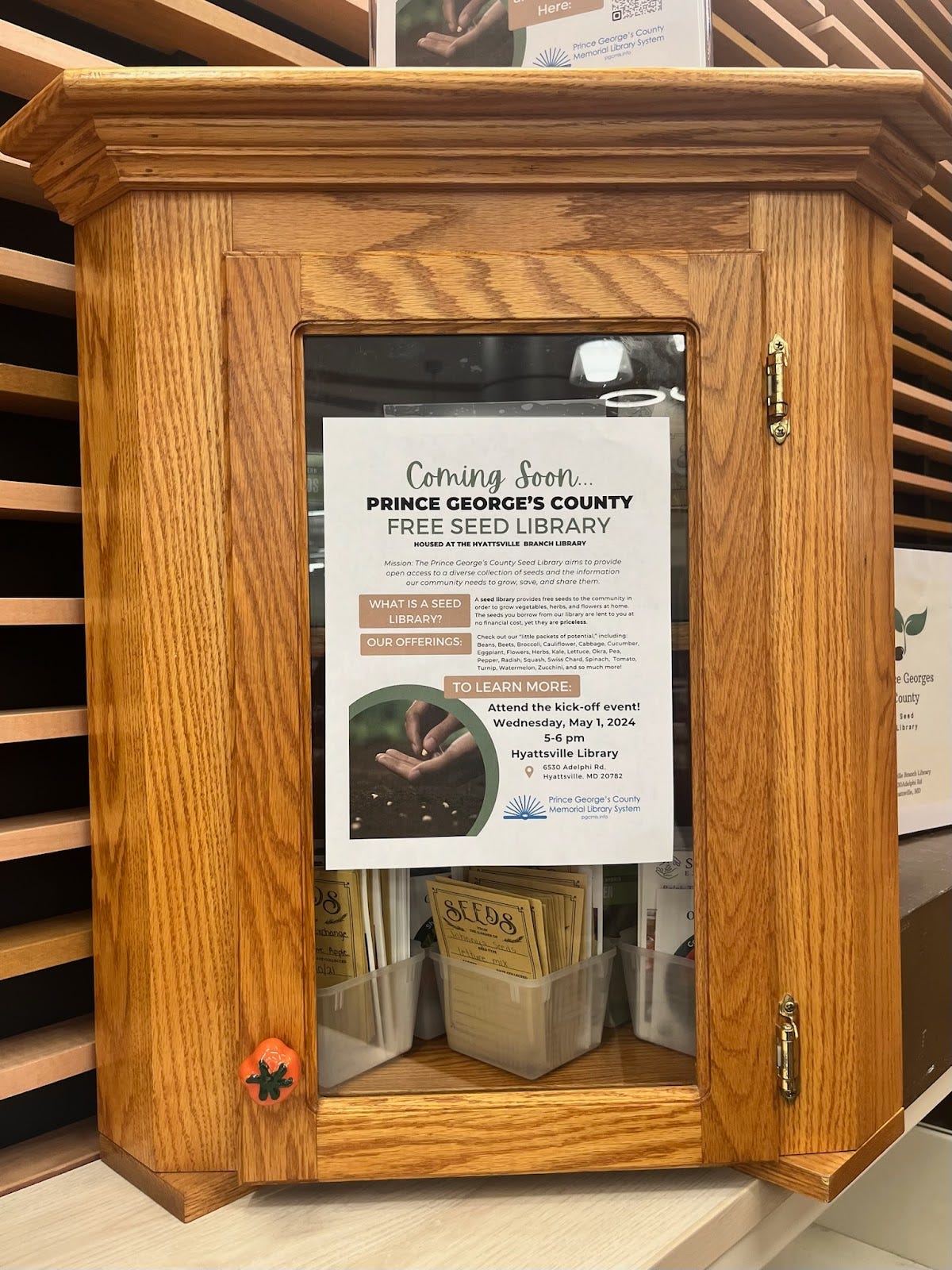From Classroom to Community Impact
By Ciara O’Brien, Founder of Prince Georges County Seed Library
What if the key to a stronger community lay in something as small as a seed?
This thought first struck me during a Changing Food Systems course in college. A large aspect of the class was centered around seeds, and our final project was creating a proposal for a seed library in the area. I loved gardening and learning about our food system on a larger scale. Still, the idea that communities could come together to share seeds, preserve biodiversity, and foster local food resilience at a grassroots level intrigued me. I never imagined that a class project would lead me to take action in my community, but my journey into the world of seed libraries did just that.
Changing Food Systems was my first encounter with the concepts of seed sovereignty, the sacredness of seeds, and their immense cultural and environmental significance. In a world where sustainability and local food production are becoming increasingly important, I learned that a seed library offers a simple yet powerful way to promote biodiversity and community resilience. Yet, amidst this newfound admiration, I was also shocked and disheartened to learn that there was a time when seed libraries faced controversy and intense legal pressure. I couldn’t believe that something I thought of as such a vital community resource was ever considered illegal. Even today, misconceptions about seed sharing persist despite its legal clearance, and it was something I had to clarify with the library before we delved too deeply into the process.
When our final project in the class required us to create a proposal for a seed library, the exercise wasn't just academic for me; it became a blueprint for something real and impactful. I’m so thankful to Dr. Elly Engle for inspiring me to turn this vision into a tangible initiative that benefits our community. A year after completing the project and graduating college, I decided to take a leap of faith and submit that same proposal to my local library system. To my amazement, the library was incredibly receptive. They couldn’t say no to such a solid proposal, and my determination only fueled their interest.

When the project started to come together, I became hyper-aware that I wasn’t equipped to undertake such a massive project alone. I realized that the DMV (D.C., Maryland, Virginia) area seemed to be somewhat of a "seed library desert." Despite the growing popularity of seed libraries nationwide, this region somehow missed the memo. I quickly turned to the Seed Library Network and became hooked on Rebecca Newburn’s Cool Beans! 🫘 Newsletter. I started pouring through archives of past issues, reading each article and watching every webinar I could find. Coincidentally, when the last issue of Cool Beans! 🫘 arrived in my inbox only two months after I initially subscribed, I was saddened to see it go.
“Help us create Seed Library Network as an organization,” I read.
In my Changing Food Systems class, I recalled learning about Richmond Grows, the Seed Library Network, and Rebecca Newburn. I had always seen them as major players in the seed library movement, and I was eager to get more involved. As I scrolled through the email, I felt a surge of excitement—I knew this was something I had to be a part of. When I saw the bold button that said, “Be a Seed Library Network Organizer!”, I didn’t hesitate to click the link.
As planning got underway for the soon-to-be Prince George's County Seed Library, I was thrilled by the overwhelming support for the project. The seed library would be housed in a newly renovated branch of the Prince George's County Memorial Library System, a place I had cherished since my childhood. Giving back to an institution that had given me so much over the years felt so rewarding.
I was fortunate to have a fantastic point of contact at the library, Caleb Valentich, who shared my enthusiasm for the project. To build our seed collection, I reached out to heirloom seed companies, nonprofit organizations, and generous gardeners in my community for donations. I even found a cabinet on Facebook Marketplace for just $5 and adorned it with an adorable tomato-shaped doorknob.
The local Master Gardeners chapter eagerly offered their support, agreeing to host a gardening workshop when we opened. My wonderful friends also rallied around the project, joining me for seed sorting “parties,” where we meticulously divided bulk seed packages into smaller envelopes.
Everything seemed to come together flawlessly, and the journey was as beautiful as it was fulfilling.
Nearly one year after submitting my seed library proposal to the Hyattsville Branch of the library, we prepared for our grand opening at the beginning of this month. I was also becoming more involved with the Seed Library Network at the same time, enjoying the opportunity to collaborate with so many like-minded individuals. It was a heartwarming moment when I discovered that Richmond Grows was also celebrating its anniversary on May 1—exactly 14 years earlier. Sharing a birthday with such a pioneering organization felt like a profound honor and a beautiful symbol of solidarity. Rebecca, who had once been an idolized figure in my eyes, had since become a mentor and dear friend.
After months of hard work and collaboration, the Prince George's County Seed Library officially opened its doors on May 1. We marked the occasion with a container garden workshop hosted by the Prince George's County Master Gardeners, where attendees planted and took home their own bean seedlings. Watching our very first patrons become official “members” of the seed library was incredibly rewarding, and seeing the project finally come to fruition was nothing short of amazing. I had earned the affectionate nickname "Seed Queen" from both friends and strangers alike, a title I wore with pride.
Reflecting on this incredible journey, I am filled with gratitude and a deep sense of accomplishment. The Prince George's County Seed Library stands as a testament to the power of unwavering determination and community support. It is already a vibrant hub where seeds, knowledge, and hope are freely exchanged, nurturing both the soil and the soul; I love that this is only the beginning.
Starting a seed library has been an incredibly rewarding experience. If the idea appeals to you, I encourage you to consider starting one, too. If you’re passionate about something, take that first step with courage and conviction—you never know where it might lead. Embrace the journey, plant the seeds of change, and watch as they grow into something truly extraordinary. For me, what began as a college project blossomed into a community-wide initiative, proving that even the smallest seeds can grow into the most impactful movements.
Interested in Starting a Seed Library?
Visit SeedLibraries.net “Start a Seed Library” tab and scroll through the pages of resources or check our some of videos on YouTube. Please subscribe and give a 👍🏽 to help other people find these resources. 🙏🏾 💚
Skillshare: Envelopes & Labels
Join us for a skillshare class to enhance your seed library's envelopes and labels!
Perfect for all skill levels, this session will cover:
Pre-Packed vs. Self-Serve: Pros, cons, and community experiences.
Envelope Info: Must-haves and how to level up.
Packing Seeds: Best practices for quantity, volunteer management, and efficient processes.
Binder vs. Envelope: Optimizing information placement for user convenience.
Interactive Discussions:
Share your experiences and challenges.
Learn from community tips and expert insights.
This skillshare is part of the Seed Library Best Practices and Inspiration Series. ✨
This class is free and all our welcome. Donations are greatly appreciated as we are 💯% community funded. 💚 Your donations help us to support more communities.
Connect with fellow seed savers and elevate your seed library game. Register now and grow with us! 🌱
Are you on the Seed Library Map📌?
We’re nearing 1000 seed libraries on the map, and there are so many more out there! If you know of an open library that is not listed, please share the census link, http://bit.ly/seedcensus. It takes about 5 minutes to get on the map… a little more if you want to answer questions about your needs and resources. Available in 16 languages.





Beautiful. And very inspiring.
Thank you so much for writing up your amazing experience. I'm in my second year of running a seed library at my branch, and you've inspired me to write a bit about my own experience (mainly for my library and members of my community). May your seed library continue to thrive in the sun.